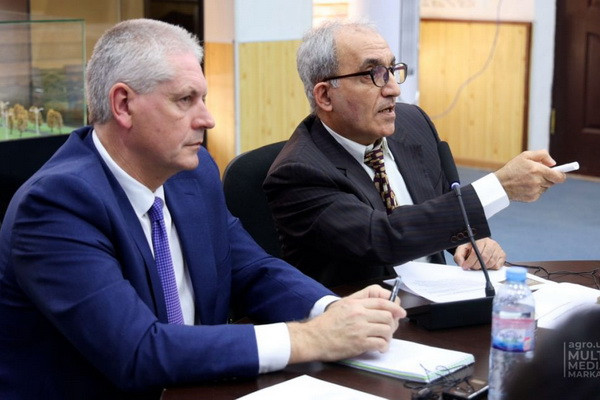
International and local experts discuss the development of the food security system in Uzbekistan
Tashkent, Uzbekistan (UzDaily.com) -- On 23 October 2019, Decree of the President of the Republic of Uzbekistan “On approval of the agricultural development strategy of the Republic of Uzbekistan for 2020-2030” was signed. The strategy sets a number of tasks to provide the country's population with safe and high-quality food at stable prices.
In cooperation with the Ministry of Agriculture, as well as relevant ministries and departments, with the technical assistance of the European Union-funded Agricultural Support and Industry Knowledge (ASK FACILITY) Program, a food safety policy is being developed using internationally recognized methods and taking into account the best experience.
In this regard, on 25 February, at the Tashkent State Agrarian University, the Ministry of Agriculture and the ASK FACILITY program organized a round table on the topic “System and strategy for food security and consumption” with the participation of members of the working group on the development of food security policy.
The meeting was attended by Adviser to the Minister of Agriculture Alisher Shukurov, Head of the ASK FACILITY Program, Political Adviser to the Minister of Agriculture of the Republic of Uzbekistan Adrian Neil, Foreign Expert - Senior Adviser on Food Security and Consumption Strategy of the ASK FACILITY Program Dr. Tugrul Temel, FAO representatives, Ministry of Investment and Foreign Trade of the Republic of Uzbekistan, Ministry of Economic Development and Poverty Reduction of the Republic of Uzbekistan, Ministry of Finance of the Republic of Uzbekistan, Ministry of Health of the Republic of Uzbekistan, Ministry of Water Resources of the Republic of Uzbekistan, State Committee on Statistics of the Republic of Uzbekistan, State Committee for Veterinary Medicine and Livestock Development, Agency for Quarantine and Plant Protection, Organization of Sanitary epidemiological service and public health, the Council of Farmers, Dekhkan Farms and Owners of Household Lands and Uzdonmakhsulotlari JSC.
At the beginning of the round table, Adrian Neal noted that the main goal of the event is to review modern food security and consumption systems based on international indicators, exchange of experience between experts, as well as the formation of an information system for the development of a food security and consumption strategy in Uzbekistan.
During the event, Dr. Tugrul Temel made a presentation on modern food safety and consumption systems based on the Food and Agriculture Organization of the United Nations (FAO).
Adviser to the Minister of Agriculture on Economics, Innovative Development and Investments Alisher Shukurov spoke about the importance of a systematic organization of the process of developing state policy in the field of food security in Uzbekistan in cooperation with stakeholders.
At the end of the round table, the participants discussed issues of mutual interest within the agenda. In particular, the impact of climate change on food security was discussed, and proposals were made to improve the culture of consumption.
As part of the event, an effective dialogue was held between members of the technical group to develop a state policy aimed at ensuring the food security of the population of the Republic, supporting their joint activities and setting new tasks.
The importance of working on a law on the food security system and creating on its basis a state structure as a single body for work on all issues of food security and nutrition was emphasized.
The Agricultural Support and Knowledge Development Program (ASK FACILITY) is a European Union assistance program in the implementation of the “Agricultural Development Strategy of the Republic of Uzbekistan for 2020-2030”.
The program is also involved in coordinating the effective implementation of reforms through dialogue among stakeholders, in particular the public, private sector and civil society, as well as strengthening the oversight of network statistics and the development of scoring systems for line systems.